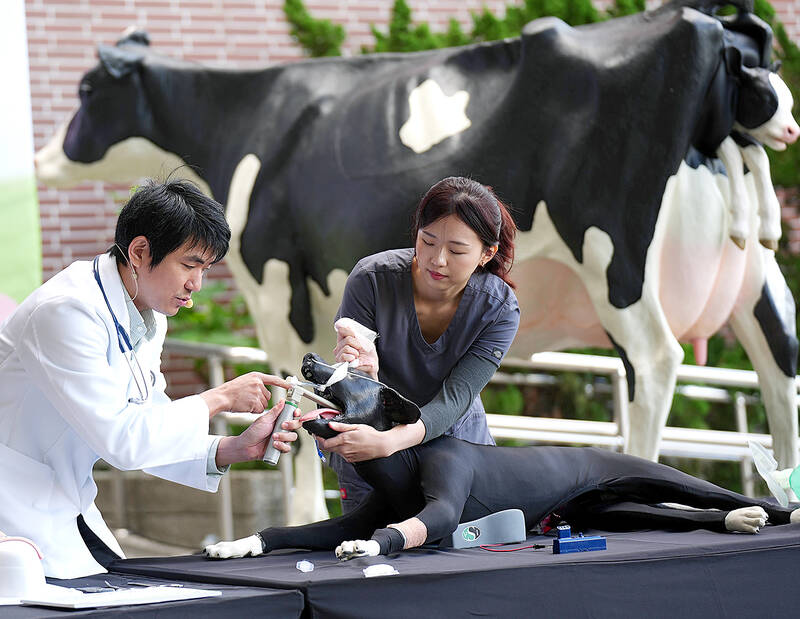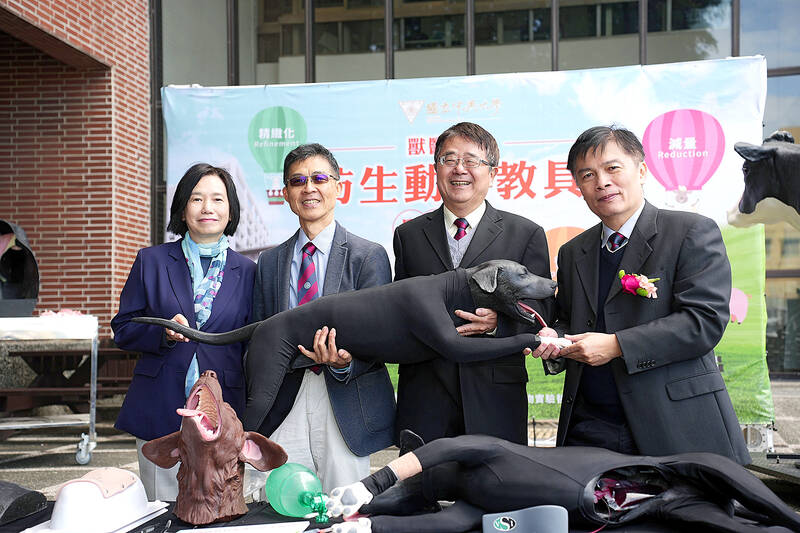The College of Veterinary Medicine at National Chung Hsing University yesterday held a ceremony to launch the use of bionic animals in clinical training.
Living animals and animal remains are indispensable in traditional veterinary medical internships, but concerns have been raised over limited resources and animal welfare, college dean Chen Peng-wen (陳德勛) said.
Using bionic animals as teaching materials is an efficient and standardized learning method that would reduce the dependence on laboratory animals, as well as enable students to practice surgical skills in a stress-free environment until they master core techniques of clinical diagnosis and treatment for small animals, he said.

Photo: Tsai Shu-yuan, Taipei Times
Bionic teaching materials can be used for practicing small animal clinical operations such as blood draws from the leg, palpation of internal organs, cardiopulmonary resuscitation, tracheal intubation, nasogastric intubation, dental surgery, spaying, bandaging and stitching. These tools are expected to help students cultivate professional capabilities in simulated environments, Chen said.
The college also introduced life-sized bionic dairy cattle from Canada under the Ministry of Education’s Higher Education Sprout Project in 2020, becoming the first institute to use bionic animals as teaching materials in Taiwan, he said.
Last year, it used funding from the Ministry of Agriculture to introduce life-sized bionic dogs for training on small animal clinical operations, Chen said, adding that five dog models were procured for each type of operation.

Photo: Tsai Shu-yuan, Taipei Times
Hsieh Chia-yu (謝嘉裕), associate professor of the college, also developed a bionic fish model for blood-draw training, he added.
Deputy Minister of Agriculture Tu Wen-jane (杜文珍) said that bionic animals could not substitute for real animals, but they could boost students’ confidence and skills.
Combined with artificial intelligence and virtual intelligence, bionic teaching materials would increase teaching quality by providing enhanced simulated context and sensory feedback in the future, she said.
University president Chan Fu-chih (詹富智) said the investment in bionic teaching materials has made the university a model for veterinary medical education nationwide, bringing multiple benefits for students, animals and the whole of society.
The college bases its teaching and training on case studies, encouraging students to practice techniques and solve problems in simulated clinical contexts, Chen said.
Such a practice-oriented teaching method allows students to learn better by deepening their understanding of diagnosis and treatment processes, ensuring that each graduate from the college is equipped with professional competencies that can be transferred immediately to the workplace, he said.

Chinese Nationalist Party (KMT) Chairman Eric Chu (朱立倫), spokeswoman Yang Chih-yu (楊智伃) and Legislator Hsieh Lung-chieh (謝龍介) would be summoned by police for questioning for leading an illegal assembly on Thursday evening last week, Minister of the Interior Liu Shyh-fang (劉世芳) said today. The three KMT officials led an assembly outside the Taipei City Prosecutors’ Office, a restricted area where public assembly is not allowed, protesting the questioning of several KMT staff and searches of KMT headquarters and offices in a recall petition forgery case. Chu, Yang and Hsieh are all suspected of contravening the Assembly and Parade Act (集會遊行法) by holding

PRAISE: Japanese visitor Takashi Kubota said the Taiwanese temple architecture images showcased in the AI Art Gallery were the most impressive displays he saw Taiwan does not have an official pavilion at the World Expo in Osaka, Japan, because of its diplomatic predicament, but the government-backed Tech World pavilion is drawing interest with its unique recreations of works by Taiwanese artists. The pavilion features an artificial intelligence (AI)-based art gallery showcasing works of famous Taiwanese artists from the Japanese colonial period using innovative technologies. Among its main simulated displays are Eastern gouache paintings by Chen Chin (陳進), Lin Yu-shan (林玉山) and Kuo Hsueh-hu (郭雪湖), who were the three young Taiwanese painters selected for the East Asian Painting exhibition in 1927. Gouache is a water-based

Taiwan would welcome the return of Honduras as a diplomatic ally if its next president decides to make such a move, Minister of Foreign Affairs Lin Chia-lung (林佳龍) said yesterday. “Of course, we would welcome Honduras if they want to restore diplomatic ties with Taiwan after their elections,” Lin said at a meeting of the legislature’s Foreign Affairs and National Defense Committee, when asked to comment on statements made by two of the three Honduran presidential candidates during the presidential campaign in the Central American country. Taiwan is paying close attention to the region as a whole in the wake of a

OFF-TARGET: More than 30,000 participants were expected to take part in the Games next month, but only 6,550 foreign and 19,400 Taiwanese athletes have registered Taipei city councilors yesterday blasted the organizers of next month’s World Masters Games over sudden timetable and venue changes, which they said have caused thousands of participants to back out of the international sporting event, among other organizational issues. They also cited visa delays and political interference by China as reasons many foreign athletes are requesting refunds for the event, to be held from May 17 to 30. Jointly organized by the Taipei and New Taipei City governments, the games have been rocked by numerous controversies since preparations began in 2020. Taipei City Councilor Lin Yen-feng (林延鳳) said yesterday that new measures by